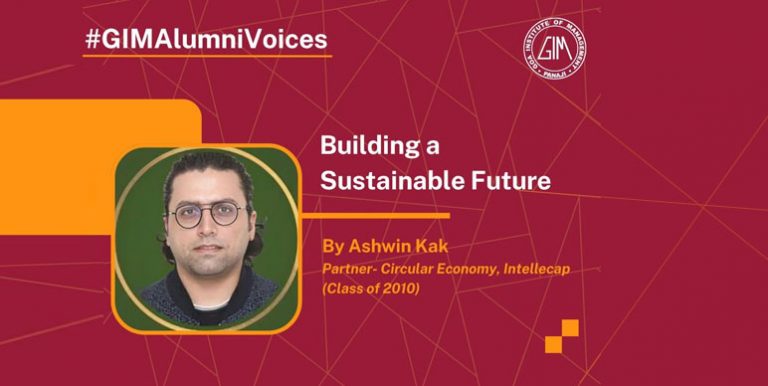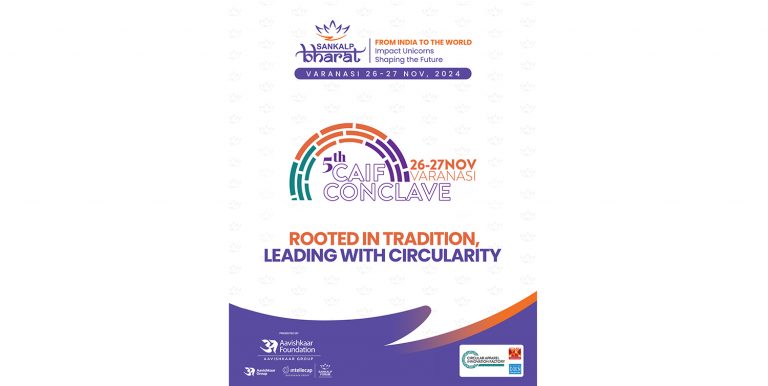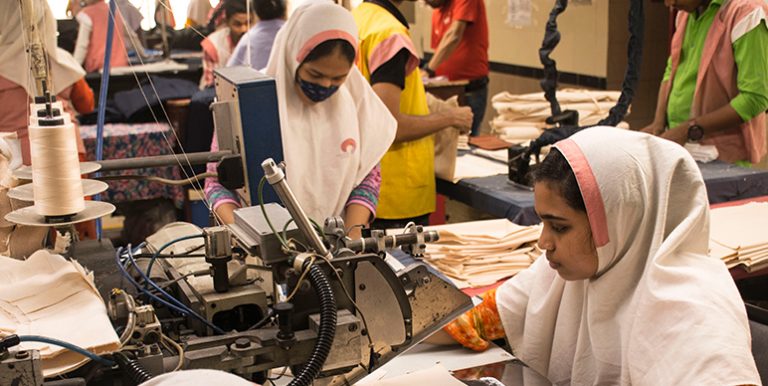Empowering Women Garment Workers in Bangladesh: Skilling for Future Opportunities in the Face of Automation- CAIF Blog
Empowering Women Garment Workers in Bangladesh: Skilling for Future Opportunities in the Face of Automation
Transforming Lives: The journey of Samima Akhter, Dolly Khatun and Shirin Akhtar
Intellecap’s Circular Apparel Innovation Factory (CAIF) are proud to be a partner to ‘Oporajita: Collective Impact on Future of Work in Bangladesh’, supported by H&M Foundation.
CAIF in collaboration with multiple partners as part of Project Oporajita, have been implementing interventions across the last 3 years that directly impact women garments workers on developing skilling and career mobility, creating enabling environments in their communities and safeguarding livelihoods through increasing the competitiveness of the RMG sector. Today we are actively engaged with 1,500 out-of-work workers, specifically focusing on those seeking reskilling and certification in these high-demand roles.
Today we are proud to talk about our work through the personal stories of three women in the RMG sector of Bangladesh, whose lives have been transformed because of our collective intervention.
The stories of Samima, Dolly and Shirin give us proof that with better skilling we can prepare them for the future, create better economic opportunities and empower women working in the garment sector to become entrepreneurs, to earn better livelihoods and to gain financial independence.
The story of Samima Akhter Shika
Mudafa is a suburban area situated near the Tongi industrial zone. It occupies a unique space that is neither classified as a village nor a town, making it a transitional community characterized by its blend of urban and rural elements. The residents largely depend on jobs within the RMG industry, which serves as the backbone of the local economy. However, a minority still engages in agriculture and livestock farming, striving to maintain their livelihoods through these traditional practices.
One such individual is Samima Akter Shika, widely known in her community as Shika Apa. She began working in a mid-level garment factory a decade ago, but her aspirations extended far beyond factory life. Driven by a strong desire for self-sufficiency and entrepreneurial independence, Shika left her job in the garment sector. She ventured into livestock rearing by acquiring a cow, but she soon encountered significant challenges as she sought to grow her livestock business in a competitive environment.
During this challenging period, Shika had a chance to meet a representative from iDE, dedicated to creating economic opportunities for marginalized communities. The representative introduced her to Project Oporajita, an initiative to empower women entrepreneurs like Shika. This opportunity ignited a spark of hope in her, and she felt an overwhelming sense of confidence that she could acquire the necessary knowledge and skills to run her own business.
Shika enrolled in two comprehensive training programs offered by iDE to enhance her business acumen: one focused on Business Management and the other on Financial Management. The training gave her valuable insights into managing a business, including budgeting, marketing strategies, and effective resource allocation. Inspired by her knowledge, Shika redefined her approach to livestock rearing, transitioning from a hobby to an entrepreneurial endeavour.
Her efforts were fruitful recently when she successfully sold four cows, earning a substantial profit that enabled her to rebuild and improve the shed for her animals. This financial boost was crucial for her business and self-esteem, reinforcing the belief that her hard work could lead to tangible success.
The iDE team has been instrumental in her journey, maintaining regular communication and offering ongoing support to ensure she can access the needed resources.
In addition to her livestock business, Shika was given another invaluable opportunity to participate in training centred around adopting circular economy practices within her operations. She described this experience as “an eye-opening training,” which educated her on the importance of reducing waste and reusing materials efficiently. As a livestock owner, she realized the potential of converting cow dung into biogas or vermicompost, which could serve multiple purposes: enriching her agricultural land and creating an additional revenue stream through sales.
Following the training, Shika enthusiastically shared her newfound knowledge and ideas with her family, who quickly recognised the benefits of converting cow dung into vermicompost. They agreed that transforming waste into a valuable resource would enhance their farming practices and contribute to improved soil health. The vermicompost produced could be utilized in their agricultural fields, and any surplus could be sold in the local market, increasing their income.
She meticulously planned her next steps and calculated that she would need at least 20,000 taka to establish a composting plant. However, she acknowledged her limitations, stating, “I know the benefits of a circular economy, but I don’t possess the technical knowledge required to build a plant that converts waste into resources and maintain it effectively.”
Despite these challenges, Shika embodies the qualities of a visionary thinker. She is determined to overcome the technical barriers standing in her way. With proper support from experts and organizations like iDE and CAIF, she believes she can successfully implement the necessary technologies to create a functioning compost facility. If given the guidance needed, Shika Apa could undoubtedly set a powerful example for her community and inspire others to embrace sustainable practices in their businesses.
The story of Dolly Khatun
Another individual employed in the sector is Doli Khatun. This is her story in her own words.
“My husband works in construction, and while we live in the city, our child stays with my parents in the village. The high cost of living strained our finances, making it clear that my husband’s income alone was insufficient.
To help, I decided to return to work. I had previously been a helper at Garments but left due to personal challenges. I enrolled in the Oporajita training program, which became a pivotal moment.
This program taught me about leather processing, the circular economy, and sustainable practices. This training equipped me with new skills and renewed my confidence. After earning my certificate, I secured a fulfilling job that allows me to balance work and family life.”
The story of Shirin Akhtar
Our final story features Shirin Akhtar, a women garment helper who joined Oporajita’s training programme. This is her story in her own words.
“I am a mother to a 4-year-old son. My husband works at a nearby hotel, but making ends meet has been challenging for our family of four. I previously worked as a helper at a factory but left due to family issues.
To improve our situation, I enrolled in the Oporajita training program, this training renewed my confidence and equipped me with valuable skills.
After completing the program, I found a job that balances work and family life. This opportunity has transformed our lives, helping us manage our needs better and significantly improving our quality of life.”
Sustaining Impact. Transforming Lives.
At Intellecap CAIF, our ambitious objective is to reach and reskill at least 30,000 women over the next three years, guiding them into new, circular job roles that align with the evolving job market. This reskilling initiative will give them the tools and knowledge necessary to succeed in these emerging positions, fostering a more resilient economy. Through these efforts, we can create a more inclusive and sustainable workforce that empowers women and enhances economic growth, ensuring a brighter future for all.








